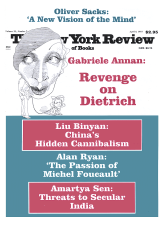In response to:
Cutting Classes from the December 17, 1992 issue
To the Editors:
David Cannadine’s interesting review of my book and others’ [“Cutting Classes,” NYR, December 17, 1992] ends with the claim that what we need in order to understand the nature of British society is neither a history of class nor a history of language but a history of status. Assuming for the moment this history is necessary, how might it be written? Cannadine’s failure to understand what is really behind the “linguistic turn” suggests that were he to take up his own challenge to write such a history he might make a pretty odd job of it. For instance, the fixation with class in British culture that he describes toward the end of his review he says was not a product of “rhetorical construction” but reflects the status-conscious nature of British society, as if this consciousness of status was something more than, or outside, such a construction.
There is in fact an aesthetic and political agenda informing Cannadine’s review that bears discussion. One indication of this is the schoolmasterly ticking-off for bad English given us authors, in which I come bottom of the class. Cannadine gives a pretty accurate account of my book, and then proceeds to claim that it would have got high marks if I had not written so obscurely. But one must be permitted the observation that if Cannadine can get a clear knowledge of the book then perhaps it is not so obscurely written after all. There really is more to the difficult knot of class and postmodernist thought than your reviewer seems to think, and I am sorry if complexity has been taken for obscurity. However, the historian as Man of Letters, the historian as Instructor to the Laity, the liberal historian of Cannadine’s own self-conception in fact, is not a figure that we all accept or admire.
Your reviewer’s agenda does I think skew his account of my book in several respects. An important example is his account of my use of the idea of “populism.” This is too “elastic” and “all-inclusive.” What Cannadine appears to be looking for here is a grand concept, analogous to the role of class, a narrative principle for a new interpretation of British history. I would like to oblige, but I have grown shy of the grand narratives modernism, especially liberalism, has so long and uncritically dealt in (even as he rejects the concept of class Cannadine cannot bear to let it go). Rather, in talking about populism I simply wanted to open up a neglected area, a history of social unities, and a neglected example of this in the history of demos and the demotic. The categories of “populism”—“the people,” “people,” “humanity”—are important precisely for their plasticity not despite it. It is this that has given them their enormous staying power as sources of social identity and political mobilisation. We need a history of “the social” that is about categories like these, which continue to be naturalised, just as until recently class was. A history of unities will at once be a history of difference (what is human is made in the shape of what is not human). This history of “the social” is going to look rather different from the kind of history of status Cannadine conceives of.
Patrick Joyce
Department of History
University of Manchester
Manchester, England
David Cannadine replies:
This is a disappointingly predictable letter. Status is merely a “rhetorical construction.” Tortured prose is a sign of intellectual sophistication. Historians who wish to reach a wide audience are neither acceptable nor admirable. Class is rejected because it is a “grand concept.” Populism is preferred for much the same reason. Such is Joyce’s “aesthetic and political agenda.” Is it any wonder that I do not agree with him?
This Issue
April 8, 1993



